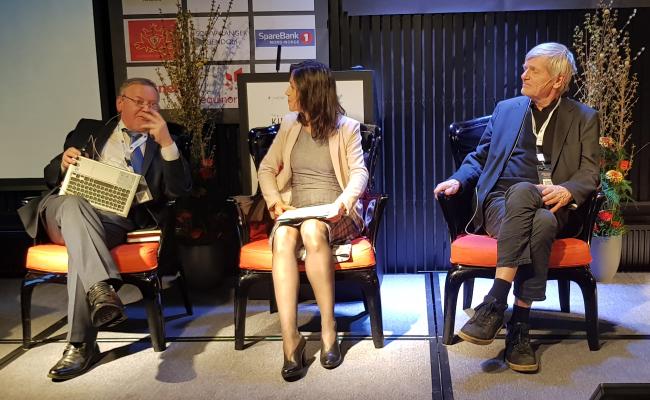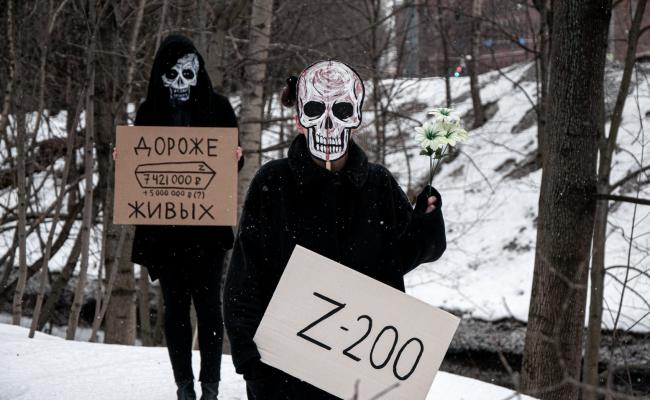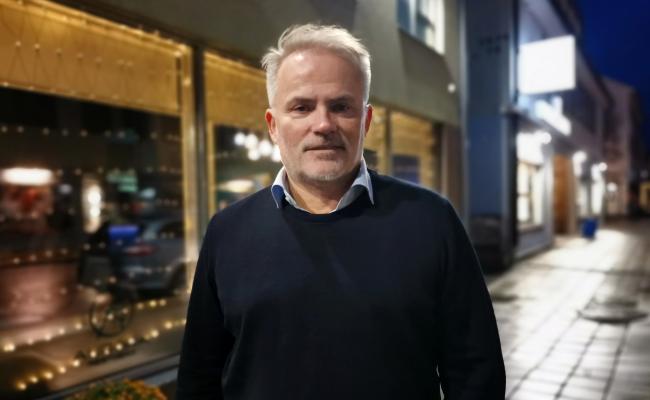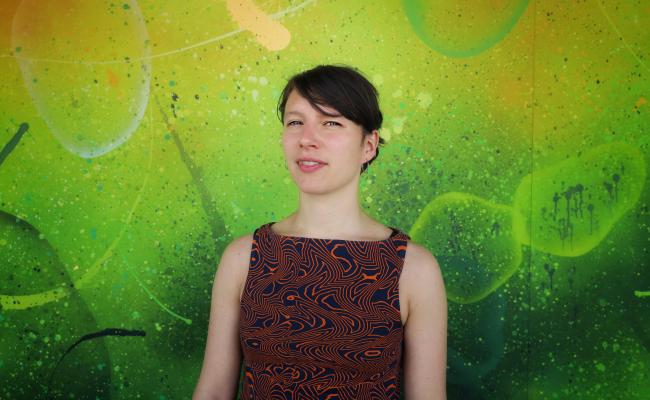Barents Spektakel Raises Questions of Doubt and Trust
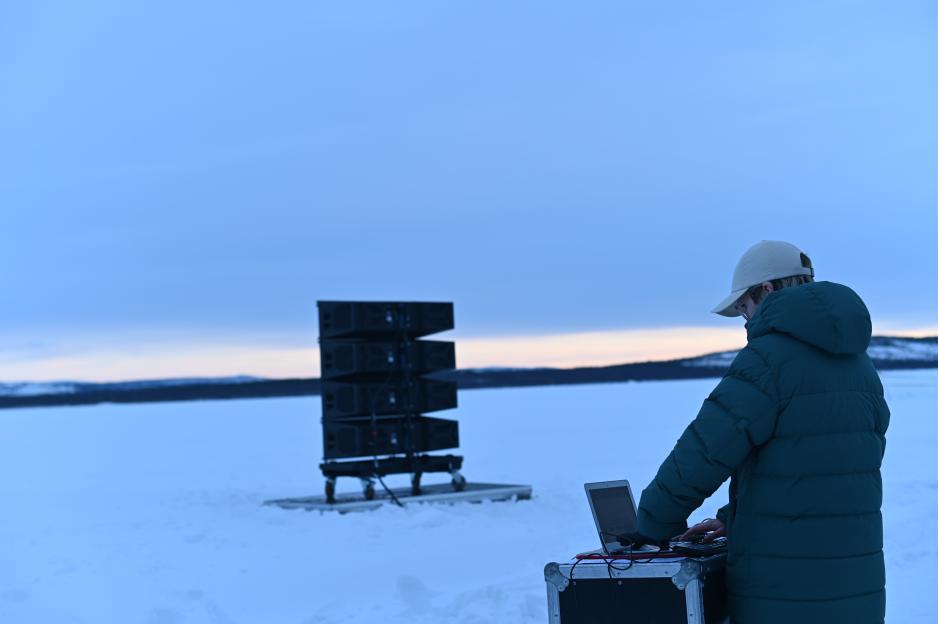
At the end of February 2022, Barents Spektakel was concluded by symbolic silence from the Russian side of the Pasvik river. (Photo: Ingrid Fadnes/Pikene på Broen)
Today – exactly one year after Russia's invasion of Ukraine and breach of trust – Barents Spektakel commences in the Norwegian border town of Kirkenes. With the help of art productions, concerts, and debates, the festival will address difficult questions of trust and border-crossing cooperation in the North.
"What does it mean to trust something or someone? How do we create and express trust – and how can lost trust be re-gained? And what part does trust play in the present – with higher food and energy prices, climate and environmental crisis, and increased geopolitical tensions?" asks the curators and producers in the collective Pikene på Broen (the Girls on the Bridge).
With these questions, the Girls open their 19th edition of Barents Spektakel today – a border-crossing art and cultural-political festival in Kirkenes, a Norwegian town close to the border to Russia.
That one year has passed since the start of the Russian invasion of Ukraine will also be commemorated. The war has had serious impacts on the trust and cooperation frameworks in the North and created significant challenges for the collective's work towards creating meeting places and building bridges in the Barents region.
"The topic of trust comes as an extension of last year's festival theme: 'Where do we go from here?'. This question became more relevant than we could ever imagine as the war in Ukraine broke out on the 2nd day of the festival. We have also given a lot of thought to the Barents cooperation turning 30 years this year," says Astrid Fadnes, Communications Manager for Pikene på Broen.
"As this cooperation is now on very uncertain ground, it is interesting to reflect on what made it possible in the beginning. This is where the seemingly simple concept of trust comes in – relevant on an international level, in interhuman relations, and towards authorities and the media. This topic is explored by the many artists and contributors to the festival."
Important and lively opening
"The opening of the festival exactly one year after the start of the war will be very special. Barents Spektakel has largely been based on Norwegian-Russian cooperation within art and culture, and throughout the last year, we have asked ourselves why we should continue organizing this festival. We have concluded that creating a platform for independent Russian voices is important in a time of war and conflict – and when such voices are quickly imprisoned in Russia," says Fadnes.
This evening will begin with a torchlight procession for peace and appeals outside the Consulate General of Russia in Kirkenes, organized by the Ukrainian Association in Norway. The torchlight procession will then move to the festival's large opening show in the town square.
"There there will be a tight line at 16 meters height on which the balancing artist Ian Eisenberg will dance. Under, there will be a bridge, built by the Russian engineer theatre AKHE, where the Finnish screaming men's choir Mieskuoro Huutajat and the local Kirkenes choir Crescendo will perform. There will also be flames and strong emotions at play."
Thereafter, the festival's opening conversation titled The day the trust was broken will take place at Samfundshuset. The conversation is based on the aforementioned questions and includes artists that participated in last year's festival and guests with backgrounds from academia, the Barents cooperation, and politics. The conversation is live-streamed on Vimeo from 19.30 CET.
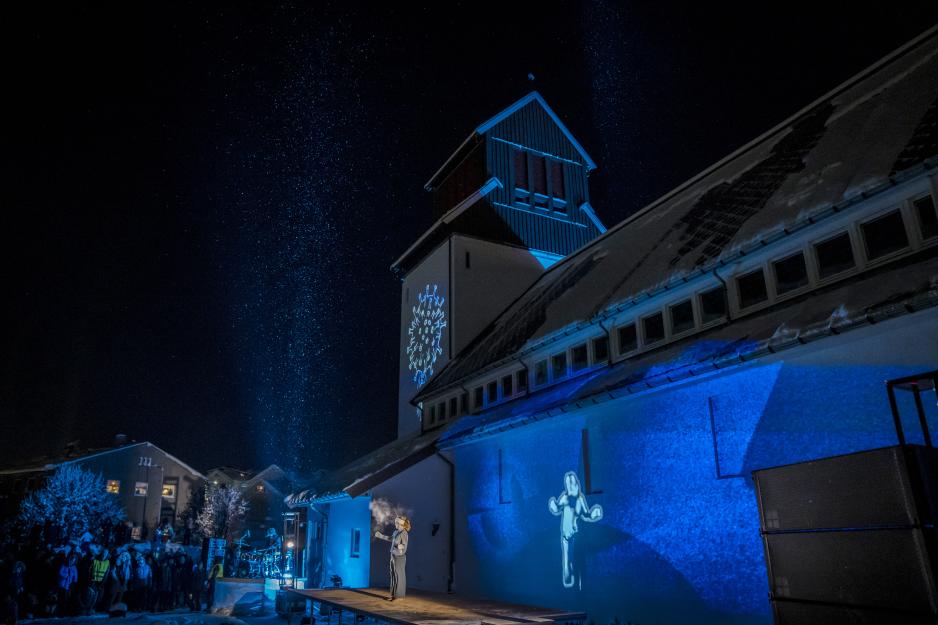
"Barents Spektakel is also an important meeting place and arena to make art and culture available for those who live in this border area," says Astrid Fadnes, Communications Manager for Pikene på Broen. Picture from the opening of last year's festival. (Photo: Ksenia Novikova/the Barents Secretariat)
Significant Russian and Finnish participation
"The Russian participation in the festival will be quite significant despite major challenges – both in regard to visas for those traveling from Russia and the risk they themselves run by cooperating with us. Several of the Russian artists who take part in the festival are also living in exile," says Fadnes.
Illustrative of this is that the Girls' premises, Terminal B, during the Spektakel will be a nomadic base for the until recently Murmansk-based Inversia festival – which can no longer be organized in Russia. Here, a community is established for an art environment that is lost in geopolitical chaos – with meditative morning sessions, exploratory workshops, as well as evening performances that transform into nocturnal experiments with sound and moving images.
"This year, we have also strengthened cooperation with the Finnish side. Barents Spektakel has many Finnish contributors to the program and volunteers – and we have set up a separate festival bus between Ivalo and Kirkenes. Among other things, we are very excited about a concert with the band Jaakko Laitinen & Väärä Raha which offers Balkan grooves, old Finnish tango, and humppa. This will be a highlight!"
Another central keyword for Spektakelet's rich program over the course of six days is a large festival exhibition.
"A big part of the exhibition is about the cod's communication and the relationship between the cod and man, and it springs from an interaction between art and research under the title Dialects of the Deep. This and several other works in the exhibition also revolve around the importance of listening, which is connected to the theme of trust," says Fadnes.
Important efforts
In a recent statement about Barents Spektakel, the Norwegian MFA Anniken Huitfeldt (Labor) praises the work of Pikene på Broen and the artists that participate in the creation of the festival.
"Cooperation with Russian cultural institutions is not possible today. That provides a special backdrop for this year's festival. It also makes Barents Spektakel's efforts to promote reflection on difficult subjects, creating meeting places, and building bridges across national borders and art genres all the more important," states Huitfeldt and continues:
"Putin's regime is increasingly powerful measures against critical voices. It is therefore important to highlight free Russian voices. They show great courage. At this year's festival, several Russian artists who discuss issues related to information, disinformation, and censorship, are presented. The festival is a rare opportunity for independent Russian artists to share their work."
The MFA also points to the expertise in the Barents region and Sàpmi (the historical settlement area of the Sàmi) as essential for future High North policy.
"The government wants to maintain activity in the North and in the border areas and to listen to local resource persons. Indigenous people contribute significantly to the knowledge of both climate and environmental issues and other matters. When we are planning the future course of our efforts in the High North, it is important for us to include indigenous perspectives and to make use of the expertise possessed in the Barents region."
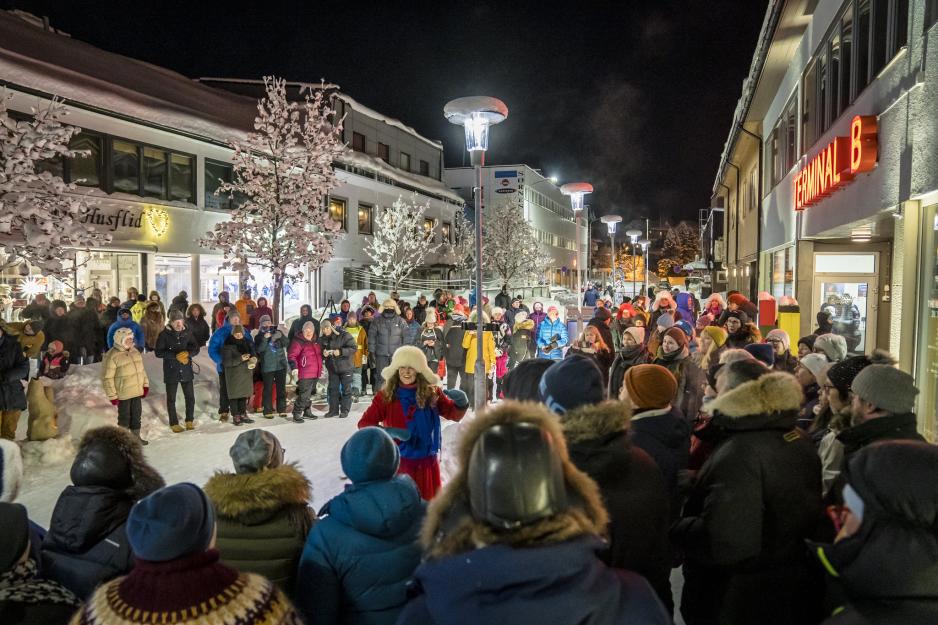
"Barents Spektakel has since the start in 2004 contributed to debate and reflection. The festival challenges us and gives us engaging experiences," Norwegian MFA Anniken Huitfeldt points out. Here is a glimpse of last year's festivities. (Photo: Ksenia Novikova/the Barents Secretariat)
Moral borders and cod
At the festival's Transborder Cafè, both people in Kirkenes and online audiences are invited to informal debates with artistic elements.
Saturday's debate, In Borders We Trust, tackles the following issues: How do we define borders and how do the borders define us and our relationships? Are there moral limits to border-crossing cooperation and how is the discussion about a cultural boycott of Russia assessed in light of other geographies?
The panel will offer perspectives from Russian protest art, Sàpmi, Turkish cultural life, and journalism. The debate can be followed from 18.00 CET on Vimeo in English – or with Russian translation – and includes a taste of the home theater performance Propaganda machine.
Tuseday's debate, In Cod We Trust, deals with Norway's continued cooperation with Russia on the management of fish resources in the North, especially the North-East Arctic cod, in a time of war and extensive sanctions. Key questions are as follows: Why is the cod the exception, how does the fishery cooperation take place, and what are the ripple effects for the cod population in the Barents Sea? The climate perspective will also be included.
Participants in this debate will, among others, be researchers with close knowledge of the Norwegian-Russian fisheries cooperation from the Fridtjof Nansen Institute and Norway's Institute of Marine Research, as well as the leaders for the Norwegian Directorate of Fisheries and the Norwegian Fishermen's Association.
The debate starts at 19.30 CET and will be rounded off with a concert with throat singing. You can follow it on Vimeo in Norwegian or with an English translation.
Also read
This article was originally published in Norwegian and has been translated by Birgitte Annie Molid Martinussen.



